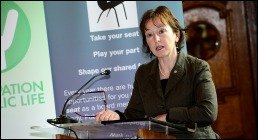Diversity and Disability in Public Life

Diversity and Disability in Public Life
Guest blog by Judena Leslie,
Commissioner for Public Appointments NI
The reason for encouraging more diversity in public life is to make sure that public life benefits from “talent in its broadest, most brilliant form, not just that of a tiny elite”. These are the words of Lord Holmes in the introduction to his review on opening up public appointments to disabled people.
I fully agree with the centrality of this principle. An organisation or an administration that excludes groups of people from leadership or management or employment because those people come from a different background or life experience – that organisation is losing out on talent.
And to quote Lord Holmes again: “Currently, talent is everywhere, but opportunity is not.”
When I took up the post of Commissioner for Public Appointments, I renewed the commitment of my predecessors to improving diversity on public boards. I support diversity because I believe inclusivity and fairness are important public and indeed personal values in themselves. Most of us, I believe, would prefer to live in a society that values fairness and inclusivity. I also promote diversity because I am convinced it will improve how our public boards work. A public board can provide more constructive challenge and insight and skills to the public body when its members can articulate different points of view, have a wider range of experience and can reflect the diversity of the society served by the Board.
As Commissioner, I have focused my efforts to date on promoting gender equality targets on our boards particularly at Chair level where 76% of posts are held by men. I have concentrated on this mainly for tactical reasons. I have access to limited resources – there are only three staff in my office so I have to be realistic about what we can undertake. But by changing the gender stereotypes around leadership, I believe the way will be opened for more widespread change that will benefit other underrepresented groups such as people with disabilities.
This year I want to extend my efforts specifically to promote the need to open up public appointments to people with disabilities. And to this end I am implementing a number of practical measures:
We have already, in partnership with the Equality Commission, run one accessible workshop for people with disabilities information and insights into the public appointments process.
In his review, Lord Holmes highlighted examples of poor reasonable adjustments, poor interview etiquette and feedback which suggested low disability awareness and lack of disabled representation on public appointment selection panels. My office is currently working with the Executive Office to develop a training package for selection panels and officials running public appointment competitions. I will personally ensure there is a strong element dealing with disability awareness in that training.
CPANI will establish a mentoring programme, commencing in September 2020, to support talented disabled individuals who have an interest in serving on public boards or who wish to better understand the work of public boards.
CPANI will work with departments and the Equality Commission on a pilot project aimed at removing barriers to disabled people from the public appointments system and hopefully seeing more success for individuals with disabilities.
CPANI will work with the Executive Office to explore the value of alternative board structures (associate members, observers, shadow members, shadow boards and so on), as recommended in the Lord Holmes review.
My staff and I will be working to improve the understanding of disability by public boards to enable them to become more confident in attracting, recruiting and retaining talent of people with disabilities. Together with the Equality Commission, which will be working on ways to promote participation in public life to people with disabilities, we hope to make boards more fully representative of the people of Northern Ireland.

Read more about the
Equality Commission's priorities and recommendations for participating in public life in Northern Ireland
Posted on 29 Oct 2019 by
Web Team